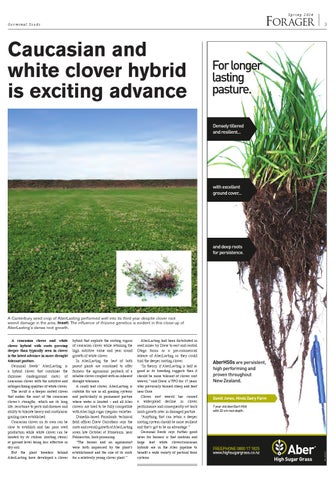s
S p r i ng 2 014
FORAGER
Germinal Seeds
Caucasian and white clover hybrid is exciting advance
3
For longer lasting pasture.
nt n e
Densely tillered and resilient...
g g r s e g e y
s nt r s
with excellent ground cover...
n
e il a,
d e, r s
at n r
A Canterbury seed crop of AberLasting performed well into its third year despite clover root weevil damage in the area. Inset: The influence of rhizome genetics is evident in this close-up of AberLasting’s dense root growth. A caucasian clover and white clover hybrid with roots growing deeper than typically seen in clover is the latest advance in more drought tolerant pasture. Germinal Seeds’ AberLasting is a hybrid clover that combines the rhizomes (underground roots) of caucasian clover with the nutritive and nitrogen fixing qualities of white clover. The result is a deeper rooted clover that makes the most of the caucasian clover’s strengths, which are its long life, resistance to pests and diseases and ability to tolerate heavy and continuous grazing once established. Caucasian clover on its own can be slow to establish and has poor seed production while white clover can be limited by its stolons (rooting stems) at ground level being less effective in dry soil. But the plant breeders behind AberLasting have developed a clover
hybrid that exploits the rooting vigour of caucasian clover while retaining the high nutritive value and year round growth of white clover. In AberLasting the best of both parent plants are combined to offer farmers the agronomic payback of a reliable clover coupled with an inherent drought tolerance. A small leaf clover, AberLasting is suitable for use in all grazing systems and particularly in permanent pasture where water is limited – and all Aber clovers are bred to be fully compatible with Aber high sugar ryegrass varieties. Dunedin-based Farmlands technical field officer Drew Carruthers says the roots and overall growth of AberLasting sown late October at Stoneburn, near Palmerston, look promising. “The farmer and an agronomist were both impressed by the plant’s establishment and the size of its roots for a relatively young clover plant.”
AberLasting had been distributed in seed mixes by Drew to east and central Otago farms as a pre-commercial release of AberLasting so they could trial the deeper rooting clover. “In theory, if AberLasting is half as good as its breeding suggests then it should be more tolerant of clover root weevil,” said Drew, a TFO for 17 years who previously farmed sheep and beef near Gore. Clover root weevil has caused a widespread decline in clover performance and consequently set back lamb growth rates in damaged pasture. “Anything that can retain a deeper rooting system should be more resilient and that’s got to be an advantage.” Germinal Seeds says further good news for farmers is that medium and large leaf white clover/caucasian hybrids are in the Aber pipeline to benefit a wide variety of pastoral farm systems.
AberHSGs are persistent, high performing and proven throughout New Zealand. David Jones, Hinds Dairy Farm 7 year old AberDart HSG with 32 cm root depth.
FREEPHONE 0800 17 1825 www.highsugargrass.co.nz
GSL 0634-g2
r e a . s al t, g
and deep roots for persistence.
